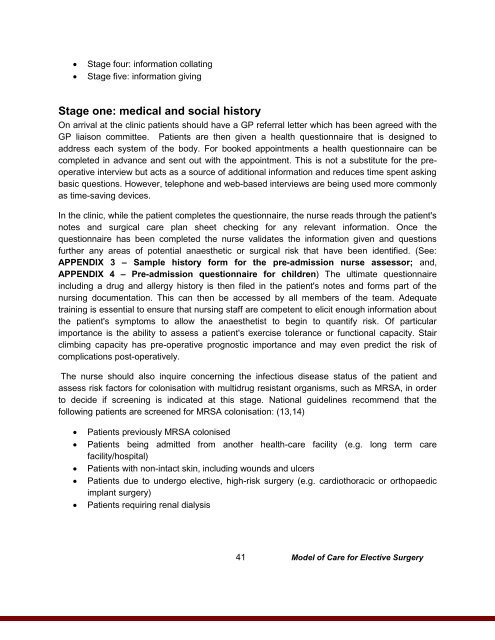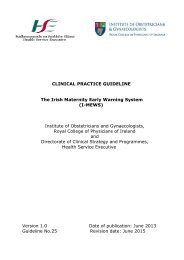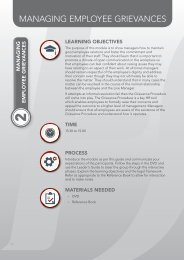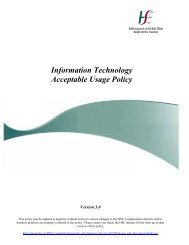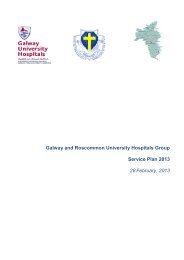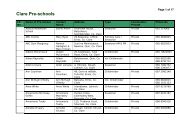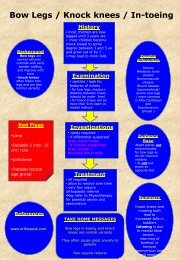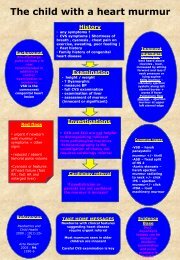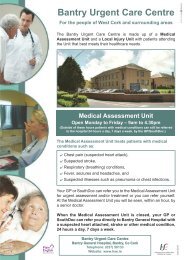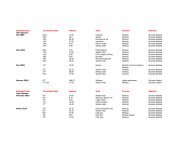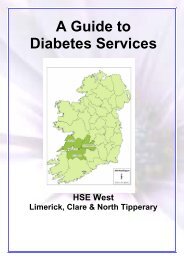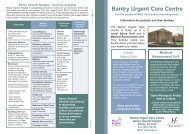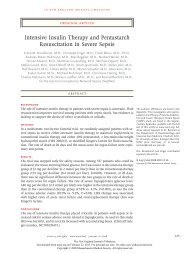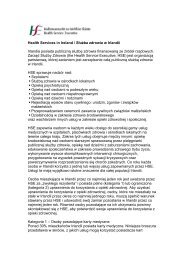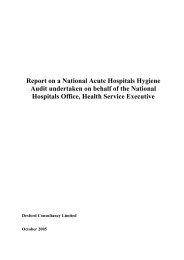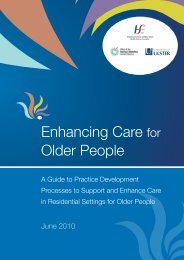Elective Surgery Programme Implementation Support Guide
Elective Surgery Programme Implementation Support Guide
Elective Surgery Programme Implementation Support Guide
Create successful ePaper yourself
Turn your PDF publications into a flip-book with our unique Google optimized e-Paper software.
Stage four: information collating<br />
Stage five: information giving<br />
Stage one: medical and social history<br />
On arrival at the clinic patients should have a GP referral letter which has been agreed with the<br />
GP liaison committee. Patients are then given a health questionnaire that is designed to<br />
address each system of the body. For booked appointments a health questionnaire can be<br />
completed in advance and sent out with the appointment. This is not a substitute for the preoperative<br />
interview but acts as a source of additional information and reduces time spent asking<br />
basic questions. However, telephone and web-based interviews are being used more commonly<br />
as time-saving devices.<br />
In the clinic, while the patient completes the questionnaire, the nurse reads through the patient's<br />
notes and surgical care plan sheet checking for any relevant information. Once the<br />
questionnaire has been completed the nurse validates the information given and questions<br />
further any areas of potential anaesthetic or surgical risk that have been identified. (See:<br />
APPENDIX 3 – Sample history form for the pre-admission nurse assessor; and,<br />
APPENDIX 4 – Pre-admission questionnaire for children) The ultimate questionnaire<br />
including a drug and allergy history is then filed in the patient's notes and forms part of the<br />
nursing documentation. This can then be accessed by all members of the team. Adequate<br />
training is essential to ensure that nursing staff are competent to elicit enough information about<br />
the patient's symptoms to allow the anaesthetist to begin to quantify risk. Of particular<br />
importance is the ability to assess a patient's exercise tolerance or functional capacity. Stair<br />
climbing capacity has pre-operative prognostic importance and may even predict the risk of<br />
complications post-operatively.<br />
The nurse should also inquire concerning the infectious disease status of the patient and<br />
assess risk factors for colonisation with multidrug resistant organisms, such as MRSA, in order<br />
to decide if screening is indicated at this stage. National guidelines recommend that the<br />
following patients are screened for MRSA colonisation: (13,14)<br />
Patients previously MRSA colonised<br />
Patients being admitted from another health-care facility (e.g. long term care<br />
facility/hospital)<br />
Patients with non-intact skin, including wounds and ulcers<br />
Patients due to undergo elective, high-risk surgery (e.g. cardiothoracic or orthopaedic<br />
implant surgery)<br />
Patients requiring renal dialysis<br />
41 Model of Care for <strong>Elective</strong> <strong>Surgery</strong>


